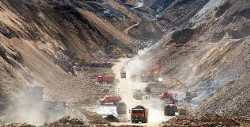Tibetet Segítő Társaság Sambhala Tibet Központ
Tibet Support Association Sambhala Tibet Center
székhely / telephely H-Budapest I. Attila út 123..
(00-36) 70 431 9343 (00-36)70 944 0260 (06-1)782 7721
sambhala@tibet.hu www.tibet.hu tibetpress.info
Facebook/Sambhala Tibet Központ Facebook/Tibett Segítő Társaság
MagnetBank/ 16200010-00110240
IBAN/HU94 16200010 00110240 00000000 SWIFT/HBWEHUHB
(1%) adószám/ 18061347-1-41
nyitva tartás/hétköznap 12.00-20.00 hétvégén előadás függő
» Retro» Tibeti művészet» Interjú» Levelek» Tibet Press» Tibet Press English» Dharma Press» Human Rights» Világ» Kína» Magyar» Ujgur» Belső-Mongólia » KőrösiCsoma» Élettér» Határozatok» Nyilatkozatok» tibeti művészet» lapszemle.hu» thetibetpost.com» eastinfo.hu» rangzen.net» ChoegyalTenzin» tibet.net» phayul.com» DalaiLama.com» vilaghelyzete.blogspot.com» Videók» Linkek» TibetiHírek» Szerkesztőség
A Tibetiek szent hegyénél bányásznának, egy embert letartóztattak
2018. március 21./Phayul.com/TibetPress
Jelenleg csak angolul olvasható. Magyarul később.
eredeti cikk
By Tenzin Dharpo
 DHARAMSHALA, Mar. 21: A mountain considered sacred by Tibetans in Driru (in Chinese, Biru) county in the Nagchu prefecture of the Tibet Autonomous Region is set to be mined by Chinese authorities despite resistance by local Tibetans. A Tibetan man is reportedly detained after he refused to sign an approval for the mining.
DHARAMSHALA, Mar. 21: A mountain considered sacred by Tibetans in Driru (in Chinese, Biru) county in the Nagchu prefecture of the Tibet Autonomous Region is set to be mined by Chinese authorities despite resistance by local Tibetans. A Tibetan man is reportedly detained after he refused to sign an approval for the mining.
Late last month, villagers were forced to sign approval for the mining by Chinese authorities, the village head man refused for the same. “Karma, the head of Markor village, said that he would sign his name only if the local Chinese officials produced a letter from two Tibetan higher-ups named Radi and Tenzin showing their own approval for the work, and he was detained by the police,” a source cited by Radio Free Asia said on the condition of anonymity.
Excavation works for the area began by the end of last year with roads being built in the foothills and red flags set as markers in the sacred mountain for Tibetans known as Sertra Dzagen.
“Locals believe that mining activities on this sacred mountain may lead to the extinction of animal species such as wild sheep, antelope, and elk, and could possibly trigger landslides on nearby Drakkar mountain, located just to the left of Sertra Dzagen,” the same source said.
Economists have estimated that Tibet’s gold and copper deposits alone are worth one trillion dollars to China. The resources are extracted relentlessly over the past few decades with little or no regard to the environmental consequences. In occupied Tibet, areas which are mined have experienced polluted water bodies, unseasonal weather patterns and an upsurge in natural calamities which has far reaching affects to the global climate change.
